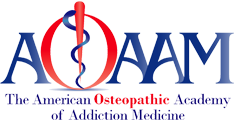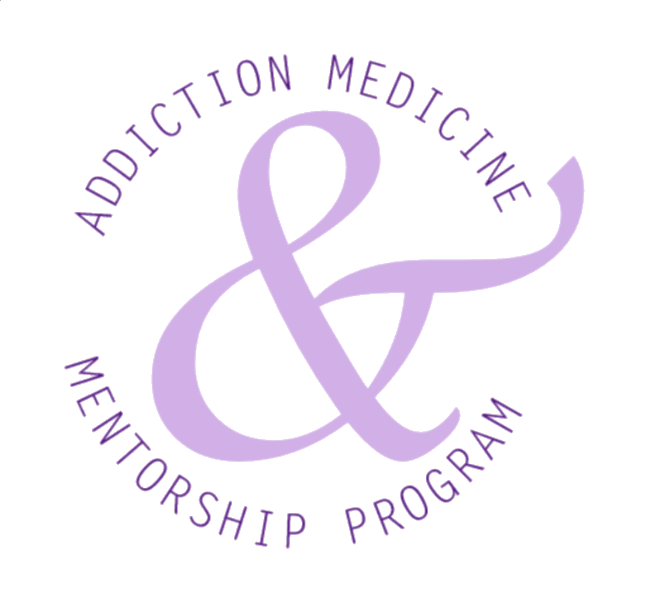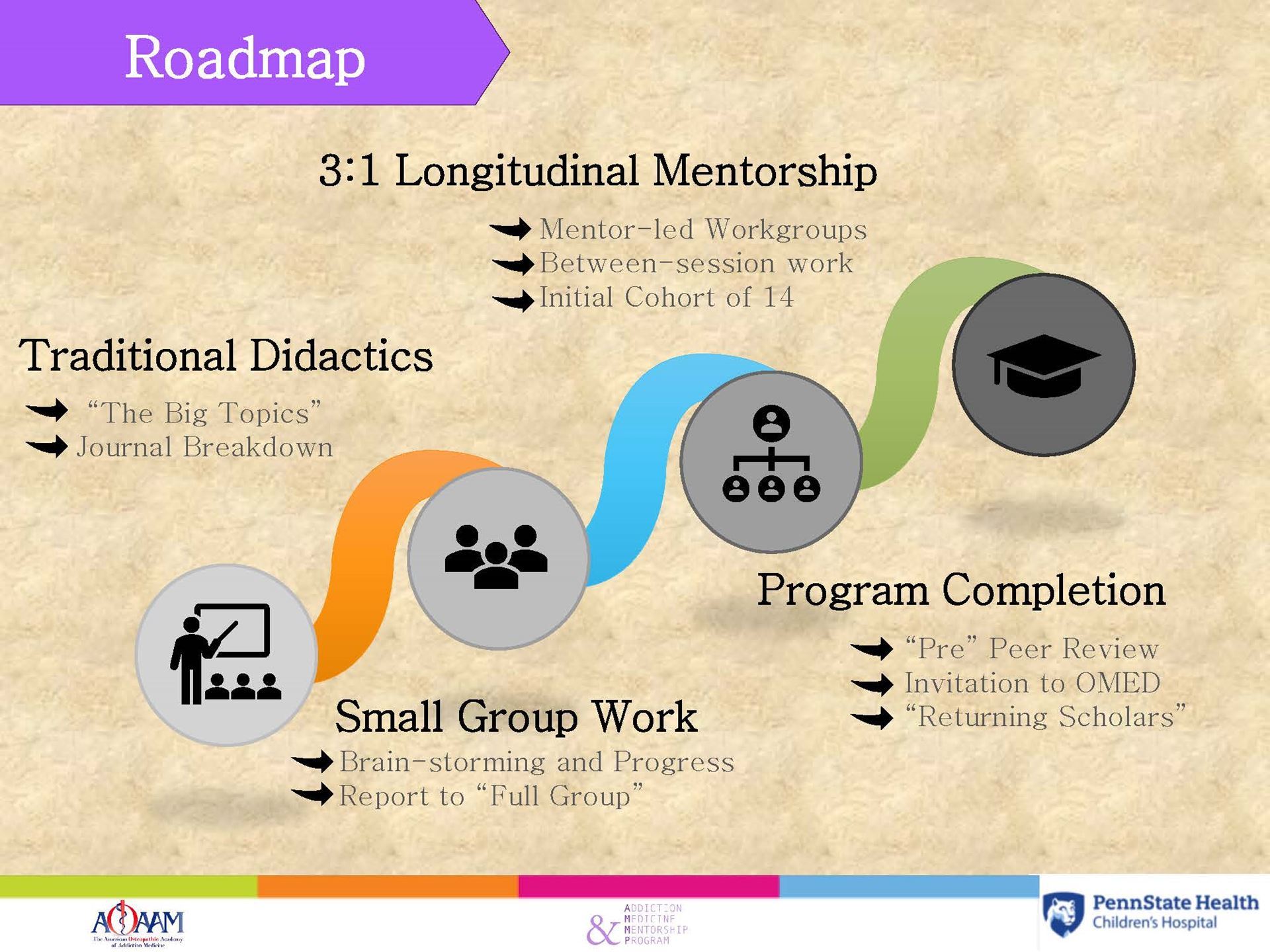Use this link to view a 5-slide “pitch deck” of the program structure. AMMP FAQs - For Students1) Q: What’s the goal of this program?A. The program’s goal is to learn the process of peer review and academic publication, viewed through the lens of Addiction Medicine.2) Q: Are there any costs or fees associated with the program? A. Mentors and speakers have generously volunteered their time, so there is no “tuition” for this program. There is one video called “Hungry Hearts” that we ask students to watch prior to the first meeting, which is available for $3.99 on Amazon. This should be the only financial investment required during the program.3) Q: What is the structure of the program? A. Small groups of students will be paired with a single mentor. At each meeting, the groups will meet with their mentor to discuss and work on their project, roughly for one hour. The second half of the meeting will be a didactic session on a topic pertinent to the field of Addiction Medicine/Addiction Psychiatry. Each session will run from 6PM-8PM EST.4) Q: Does everyone do their own project? How do we list the authors? A. The projects will be group projects, coordinated amongst your small groups. The survey completed prior to enrollment in the program will serve as a way to group students by interest, region, etc. Authors will be listed alphabetically, and the mentor will be listed as the last author, as is standard when “senior authors” contribute to an academic publication.5) Q: What kinds of projects are appropriate? A. Based on our estimations, and the success of the first cohort, the projects most suited to a program of this type will be either a narrative review or a policy paper. Examples can be found on the AMMP website, and specific training in how to write these types of manuscripts will be provided during the course of the program.6) Q: Will I be able to publish my project in an academic journal? A. Maybe! We cannot guarantee that projects will be publishable, though all projects will be hosted on the AMMP website. The intent of the program is to learn the process of academic publication and creating quality submissions.7) Q: What if I miss a meeting? Is there a limit to how many I can miss? A. Ideally, all students will be able to attend all meetings, but we understand how busy medical student schedules are. We ask that you let your mentor and small groups know if you’ll miss a meeting so they can catch you up on project status. You should also let Dr. Latronica and Judy Pfeiffer know so that they can log attendance. There is no “minimum” number of meetings required to complete the program, but if a student misses more than two, it may be difficult to meaningfully participate in the program.8) Q: What if I miss the didactic potion of the meeting? A. The didactic portions of meetings, and associated slides, will be available on the AMMP website shortly after the meeting.9) Q: How will people know that I participated in this program?
AMMP FAQs - For Mentors1) Q: What is my role in the program?A. You will meet with your small group of students/mentees for the first hour of each meeting. You will discuss project ideas and goals, and help students fine-tune their projects. Each session will run from 6PM-8PM EST.2) Q: Can I claim CME for this? Do you have any grant funding for this? A. We did check with both the AOA and AMA, and mentorship activity is, unfortunately, unavailable for CME. At this time, we do not have a grant or other funds we can disburse; we are extremely grateful for the time volunteered by our mentors and speakers.3) Q: What kind of time investment will this entail? A. The program will run for most of the calendar year, with 8-9 total meetings. Each meeting will require roughly an hour of your time. Outside of those meetings, we are not asking mentors to meet with students, but to be available for research/editing/advice/etc. We estimate that the entire program should take no more than 20 hours of your time.4) Q: What if I must miss a meeting?
For Speakers/Lecturers1) Q: What is my role in the program?A. You will give a ~45-50-minute didactic session on a topic previously decided between yourself and the program administrators. Each session will run from 6PM-8PM EST. Your lecture will happen in the second half of the meeting, from 7PM-8PM EST.2) Q: Can I claim CME for this? Do you have any grant funding for this? A. We did check with both the AOA and AMA, and mentorship activity is, unfortunately, unavailable for CME. At this time, we do not have a grant or other funds we can disburse; we are extremely grateful for the time volunteered by our mentors and speakers.3) Q: What type of structure are you looking for in these talks? A. As long as your presentation is “on-topic” we prefer our speakers have a significant degree of freedom in terms of their talks. Basic epidemiology, pharmacology, and treatment paradigms are likely useful parts of your talks, but we try to avoid delegating specifics or “over-advising.” If you have questions or would like a “second set of eyes” on your presentation, Dr. Latronica, Dr. Lande, or Dr. Bograkos will be happy to assist.4) Q: Who is the audience? A. The audience is comprised of medical students, from MS1-MS4. We have previously explained to the students that depending on the topic, and where they are in their training, that some concepts may temporarily be “over their heads.” We offer them additional guidance if they have questions after each presentation, so do not be concerned about “over-explaining” or “under-explaining.” Because of the nature of the program, concepts will be repeated and expanded upon throughout the program.5) Q: How will I be reminded of my meeting time? A. The entire year of meetings is planned out ahead of time, and .ics files are available on the AMMP website that will allow you to add your specific meeting to your calendar. You will also be notified by email one month, two weeks, and one day prior to your lecture.6) Q: What if I must miss my lecture? A. Unlike the mentor paradigm, we do not have a good “replacement” strategy if speakers are unable to deliver their lecture. We can potentially switch the order if we have enough time, or one of our program administrators can deliver the topic themselves, but ideally we can settle on a date that works for you in the interest of ease of scheduling.7) Q: Are these lectures stored anywhere? A. If speakers are comfortable with it, we ask that they permit us to record their didactic session. We also ask for a copy of their slide deck so that it can be uploaded to the AMMP website. This way, students who miss meetings will be available to “catch up.” Coming soon. Meetings for 2023-2024 are tentatively scheduled from 6:00 - 8:00 PM ET on the dates noted below. The mentor sessions are from 6:00 - 7:00 PM ET; the didactic sessions are 7:00 - 8:00 PM ET:
Coming soon. |


